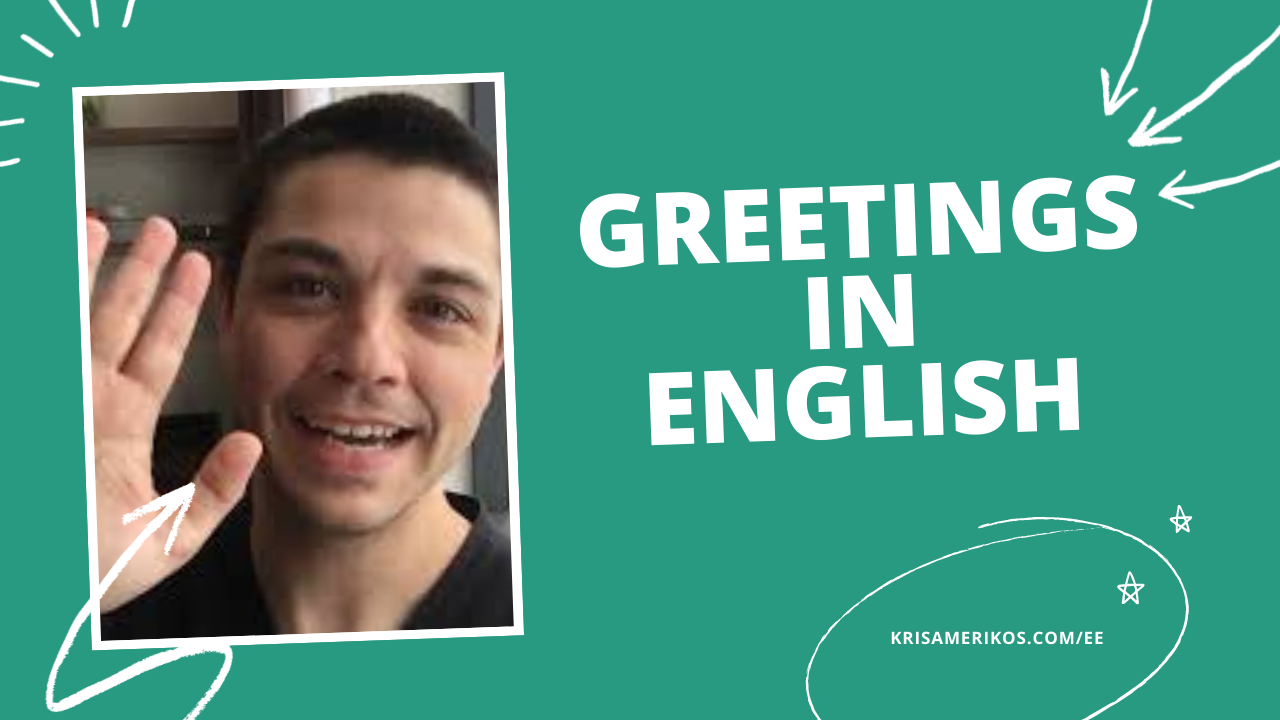Greetings in English - Words and Phrases

Native English speakers have many different ways that they greet each other. Greetings range from casual questions to polite inquiries - and it’s a great idea to learn as many different ways to greet other people in English.
Learning how to greet people in English will equip you with a greeting for every situation. There are some greetings that must only be used in formal situations, others that can only be used in informal situations and some that can be used in both.
What Are Greetings in The English Language
Greetings are used to say ‘hello’ and ‘how are you?’ and to say ‘goodbye’ and ‘nice speaking with you.’ Greetings are words we use when we see someone for the first time in a day, when we want to introduce ourselves to others and when we want to find out how someone is feeling.

It’s considered polite to ask someone how they are when we greet them in English. There are many different ways to do this from surface-level questions like ‘are you doing well?’ to more personal questions like ‘how have you been?’ The greeting you choose will be based on the formality of the situation, who you are speaking to and the relationship you have with the person you’re speaking to.
How To Greet People in English
We can greet people with a one-word greeting like ‘hello,’ ‘hi,’ ‘hey’ or ‘morning.’ Or we can use formal greeting phrases like ‘good morning,’ ‘good afternoon,’ or ‘good evening.’ In this blog, we’ll look at different ways to greet people in English in different settings.
Greeting Conversation in English
Greetings are always a two-way conversation. It’s considered rude not to return a question when someone asks ‘how are you?’ There will be a moment of awkward silence if you reply with ‘I’m good’ without adding ‘and you?’
Here’s an example of a greeting conversation in English:
Person 1: “Hello! How are you?”
Person 2: “I’m good thanks. And you?”
Person 1: “Can’t complain.”
This conversation is a great example of what is expected when greeting in English. Once the first person has responded, you are free to open the conversation up because the formalities are out of the way.
Types of Greeting in English
Greetings range from very formal to very informal. There are also greetings that are used to open a conversation and introduce ourselves to the people we are speaking with and closing greetings to end a conversation or a speech.
Formal Greetings
There are few formal greetings in English. Formal greetings are usually not questions and formal greetings are never reduced when speaking. We must say each word clearly when speaking in a formal situation. The main difference between formal and informal greetings is that formal greetings are not reduced in spoken English or written English.
What Are Formal Greetings in English
There are times when we need to be courteous and very polite. It’s important to learn formal greetings in English in case you need to start a speech in a board meeting or to introduce yourself to your partner’s parents. It’s not often that we find ourselves in situations that require very formal English, but it’s a good idea to brush up on formal greetings in English just in case.

Examples of Formal Greetings
“How do you do?”
This is the only formal question greeting in English. It’s outdated and rarely used by native English speakers, however, it is a formal greeting nonetheless. It’s appropriate to answer this question with ‘how do you do?’ or ‘I’m well thanks, and you?’
Other common formal greetings include:
‘Hello’
‘Good morning’
‘Good afternoon’
‘Good evening’
And if you’re meeting someone for the first time formally:
‘It’s a pleasure to make your acquaintance’
‘It’s a pleasure to meet you’
‘It’s an honour to meet you!’
Informal Greetings
Informal greetings are a lot more common and there are a lot more of them. Informal greetings are the way most people greet each other on a daily basis. Informal greetings range from single-word greetings and slang terms to greetings in the form of questions.
What Are Informal Greetings in English
Informal greetings are not all created equally. Some informal greetings are more formal than others - while others are extremely informal. Extremely informal greetings are strictly reserved for your friends who are in your age group. It may be considered rude to say ‘yo’ to one of your work colleagues - but, of course, that depends on your relationship.
Examples of Informal Greetings
The most common informal greetings are:
‘Hi’
‘Hi there’
‘Hey’
‘Hey there’
‘Yo’
‘Howzit’
‘G’day!’
‘Morning’
‘Howdy’
‘How’s it going?’
‘What’s up?’
‘What’s happening?’
‘What’s good?’
‘What’s new?’
Opening Greetings
We use opening greetings to introduce ourselves in a polite way before we give a speech, start a conversation in a formal setting, or at the beginning of an email. Opening greetings are always formal greetings and can address one person or many people.
What Are Opening Greetings in English
It’s common for native English speakers to follow ‘hello’ with a follow-up statement like ‘I hope you’re well,’ when beginning a speech or an email. It’s considered a polite formality before jumping into the purpose of the speech or email. If it’s an email then the other person can respond with ‘hello, I’m well thank you and I hope you are too.’
Examples
To start a speech:
‘Good morning, ladies and gentlemen’
‘Good day, everyone’
‘Hello and welcome ladies and gentlemen’
‘Allow me to introduce myself’
To start an email:
‘I hope you’re doing well’
‘I hope you’re staying safe’
‘I hope you’re having a great day’
‘I hope you’re having a great week’
‘I hope this email finds you well’
‘Thank you for getting in touch’
‘Thank you for getting back to me’
‘Thank you for your time’
Closing Greetings
We use closing greetings in formal situations like speeches and emails as well as at the end of formal conversations. Closing greetings are your opportunity to thank someone for their time and politely show that you are grateful for the other person’s attention.
What Are Closing Greetings
Closing greetings are formal ways to end a conversation politely in English. It can be difficult to cut a conversation short without sounding rude - a closing greeting solves that problem. It signifies the end of a conversation politely. It also lets everyone involved in the conversation know that the conversation is officially over.
Examples
‘It was a pleasure to meet you’
‘It was great talking to you’
‘Thank you for your time, I look forward to talking with you again soon’
‘I’m glad we had the chance to meet’
‘It was great to meet you in person’
‘I hope you have a great day forward’
What is English Everyday
English-Everyday is an English course with live lessons for English learners who want to improve their English with native speakers, professional teachers, and students from around the world.
You have live lessons where you can join every day. You can review all record lessons. There is a calendar of scheduled lessons so you can see when lessons are and at what time you can join.
In English Everyday program, you have support and also you have student chat where you can speak with other students from all around the world. You can look at our feedback page so that you can know from which countries our students are. Before you join our program, we strongly recommend you sign up for our free seminar with Kris Amerikos, where you can learn:
- What goals you need to have to get better results
- How to become fluent in English very quickly
- What you need to do to have perfect pronunciation
- The 3 biggest mistakes you need to avoid
- Which free resources will help you learn English
- The best resource to use to improve your speaking
Best Greetings in English
The best greetings for formal situations are:
‘Hello’
‘Good morning/good afternoon/good evening.’

The best greetings for informal situations are:
‘Hey!’
‘Hi’
‘How’s it going?’
‘How are you doing?’
The best greetings for very informal situations are:
‘Yo!’
‘Hey man’
‘Hey, girl!’
‘What’s up?’
‘What’s good?’
‘What’s news?’
Most Common Greeting Phrases in English
The most common informal greeting phrases in English are question phrases. It’s very common for English speakers to use question phrases to greet others in informal situations. The tricky thing is knowing how to respond to these question greetings.
We can respond to question phrases by repeating the question. It may seem strange, but it’s perfectly acceptable to return the question in the form of a greeting. But we can also choose to answer with a quick ‘good,’ ‘can’t complain,’ ‘same old,’ or ‘nothing much.’
Examples:
Person 1: “Hey, what’s up?”
Person 2: “Hey man. What’s up?”
OR
Person 1: “Hey, what’s up?”
Person 2: “Hey man. Not much. And you?”
Person 1: “Yeah, nothing to report.”
Greeting Words in English
We advise using ‘hello’ in every situation if you are unsure of what greeting word or phrase to use in English. It can be overwhelming to know which word or phrase is appropriate for your situation. ‘Hello’ is a greeting word in English that is acceptable in every situation. It may sound a bit too formal in informal situations but you definitely won’t offend anyone.







































